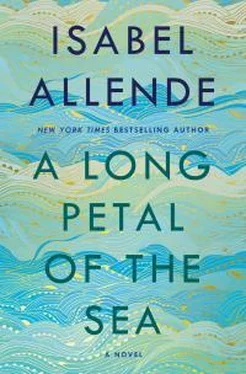Victor’s night job in the bar barely paid him enough to live on, but it helped him learn that curious trade and to study the customers. This was how he came to know Jordi Moline, a Catalan widower who had emigrated to Chile twenty years earlier and owned a shoe factory. He would often come and sit at the bar to drink and chat in his mother tongue. During one of the long nights when he sat cradling his glass of spirits, he told Victor that manufacturing shoes was boring, however profitable, and now that he was on his own and growing old, the moment had come to do as he wanted. He suggested they open a Catalan-style tavern: he would put up the money initially, and Victor would contribute his experience. Victor replied that medicine was his vocation, not running a tavern, but later that night when he told Roser about the Catalan’s bizarre proposal, she thought it was a splendid idea: better to have one’s own business than to work for other people—and if it wasn’t successful, they wouldn’t have lost much, because the shoemaker was risking the capital.
The tavern was inspired by the Rocinante, the Barcelona inn where Victor’s father played dominoes until his final days. They set up in a hole-in-the-wall with barrels for tables, hams and strings of garlic hanging from the ceiling, and a smell of sour wine, but it was in a good spot in the center of Santiago. Roser became the bookkeeper, since she had a better head for figures and knowledge of mathematics than either of the two partners. She would arrive dragging Marcel along and install him with a toy or two in a corner behind the counter, while she did the accounts. Not so much as a single glass of beer escaped her meticulous eye. They found a cook capable of preparing Catalan sausages with diced eggplant, anchovies and squid with garlic, tuna with tomato, and other delicacies from the old country, and soon had a faithful clientele of Spanish immigrants. They named the tavern the Winnipeg.
In the eighteen months that they had been married, Victor and Roser developed a perfect relationship as brother and sister and comrades. They shared everything apart from a bed: Roser because of the memory of Guillem, and Victor to avoid trouble. Roser had decided that love only strikes once, and that she had had her share. For his part, Victor depended on her to fight his phantoms: she was his best friend and he came to love her more and more as he grew to know her. From time to time he wished he could cross the invisible frontier between them, take her by the waist in a carefree moment, and kiss her, but that would betray his brother and could have disastrous consequences. One day they would need to have the discussion about how long mourning lasts, how long the dead are allowed to haunt us. Roser would decide when that moment arrived, as she decided almost everything: until then his thoughts strayed to Ofelia del Solar, like someone wasting their time imagining they’re going to win the lottery. He had fallen in love with her at first sight with adolescent intensity, but as he didn’t see her again, love rapidly became a myth to him. In his daydreams he would conjure up the details of her face, the way she moved, her dress, her voice. Ofelia was a flickering mirage that vanished at the slightest hesitation. He loved her theoretically, like the troubadours of olden days.
From the outset, Victor and Roser adopted a system of trust and mutual aid. They agreed that Marcel would be the most important thing for them until he reached eighteen. Victor scarcely remembered that Marcel was not his son but his nephew, but Roser always bore it in mind, and that was why she loved Victor as much as he loved the boy. The money they earned was stored in a cigar box for their shared expenses. Roser took charge of their finances. Each month she divided the funds into four envelopes, one for each week, and they kept strictly to that amount, even if they had to eat beans and nothing but beans. Lentils were out of the question: Victor had grown tired of them in the French concentration camp. If there was anything left over, they took the child out for an ice cream.
They were completely different, which was why they got on so well. Roser never gave in to the sentimental attitude of many exiles, refusing to look back or idealize a Spain that no longer existed. There was a reason why they had left. Her resolute sense of reality saved her from frustrated desires, pointless reproaches, deep regrets, and the vice of constantly complaining. She was oblivious to fatigue and despair: she had a tank-like determination to crush any obstacles in her way. Her plans were crystal clear. There was no way she was going to continue playing the piano for radio soap operas, where it was always the same repertoire: music that was sad, romantic, bellicose, or sinister, depending on the plot. She was thoroughly fed up with the march from Aida and Blue Danube . Her main object in life was serious music; to hell with the rest. But she had to wait. As soon as the tavern provided them with a livelihood and Victor graduated, she would enroll at the Faculty of Music. She was going to follow the path of her mentor and become a teacher and composer like Marcel Lluis Dalmau.
Her husband, on the other hand, was often overwhelmed by sad memories and the pangs of nostalgia. Only Roser was aware of these dark moments, because Victor continued to attend medical school and work in the tavern in the evening as usual. Yet he went around closed in on himself with the absent air of a somnambulist, not so much from the tiredness of someone who only sleeps in short bursts standing on his feet as horses do, but because he felt worn down, caught in a web of responsibilities. Whereas Roser imagined a bright future, he saw shadows all around them. “At twenty-seven I’m already an old man,” he would say, but whenever Roser heard that, she would berate him fiercely. “Why don’t you have more guts? We’ve all been through hard times. If you keep complaining you won’t be able to appreciate what we have: there’s a ghastly war on the other side of the ocean, and yet here we are living in peace with full stomachs. And I’m telling you we’re going to be here for a long time, because the Caudillo, curse him, is in very good health and evil people lead long lives.”
And yet at night, if she heard him crying out in his sleep, Roser softened. She would go and wake him up, slip into his bed, and hug him like a mother, letting him unburden himself of his nightmares of amputated limbs and smashed chests, shrapnel, dripping bayonets, pools of blood, and graves littered with bones.
—
IT WAS A YEAR and two months before Ofelia and Victor met again. During that time, Matias Eyzaguirre rented a mansion on one of Asuncion’s main streets, which was hardly appropriate to his position as second-in-command or his salary as a public servant. The ambassador regarded this as impertinent and never missed an opportunity to make a sarcastic comment. Matias filled the house with a shipment of furniture and decorations sent from Chile, and his mother made a special trip there to train the domestic staff, which proved difficult as they spoke only Guarani. His recalcitrant fiancée had finally agreed to marry him, thanks to his constant stream of letters and the efficacy of the Masses and novenas said by his future mother-in-law, Doña Laura.
Early in December, when Ofelia turned twenty-one, Matias traveled to Santiago for the official engagement, which took place in a ceremony in the garden of the del Solars’ house with the two families’ closest relatives, about two hundred people altogether. The wedding rings were blessed by Father Vicente Urbina, Doña Laura’s nephew. He was a charismatic, scheming, and energetic priest, better suited to a colonel’s uniform than a cassock. Although not yet forty, Urbina exerted a fearsome influence on his ecclesiastical superiors as well as on his congregation in the fashionable heights of Santiago. It was a privilege having him in the family. The date for the wedding was set for September the following year, the month for elegant nuptials. Matias placed the antique diamond ring on the fourth finger of her right hand, as a sign to any possible rival that the young woman was taken; he would transfer it to the other hand on the day of their marriage, to demonstrate that she was his once and for all. He wanted to tell her in great detail about the preparations he had made to receive her like a queen in Paraguay, but she interrupted him in a rather offhand way: “What’s the hurry, Matias? Lots of things could happen between now and September.” Alarmed, he asked what things she was referring to, and she said that the Second World War might reach Chile, there could be another earthquake, or a catastrophe in Paraguay. “In other words, nothing that concerns us,” Matias concluded.
Читать дальше











